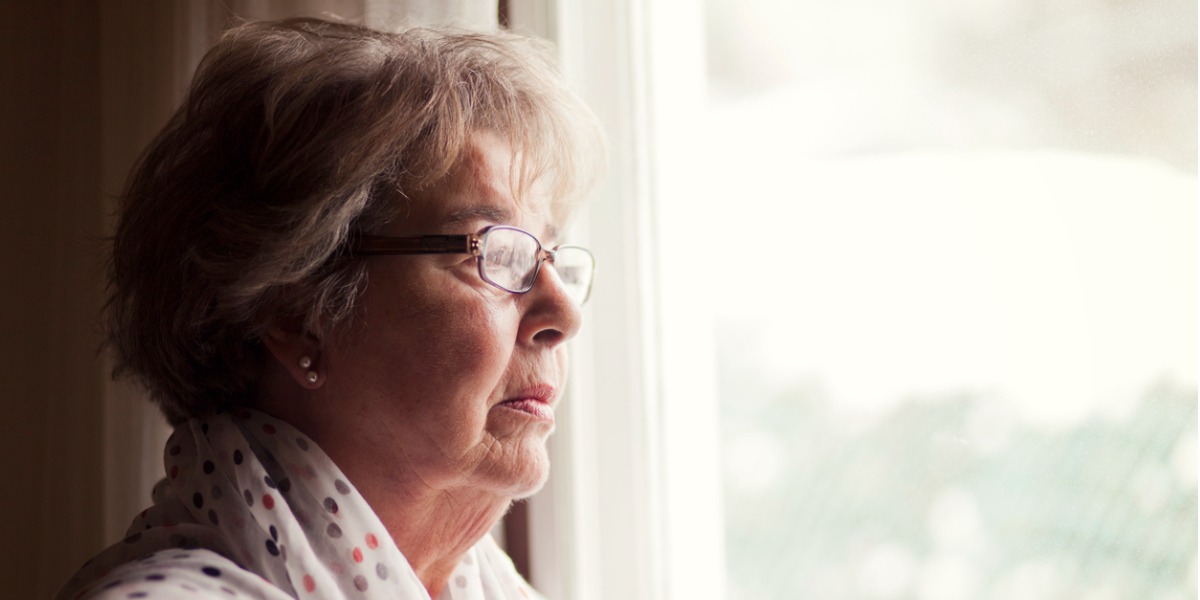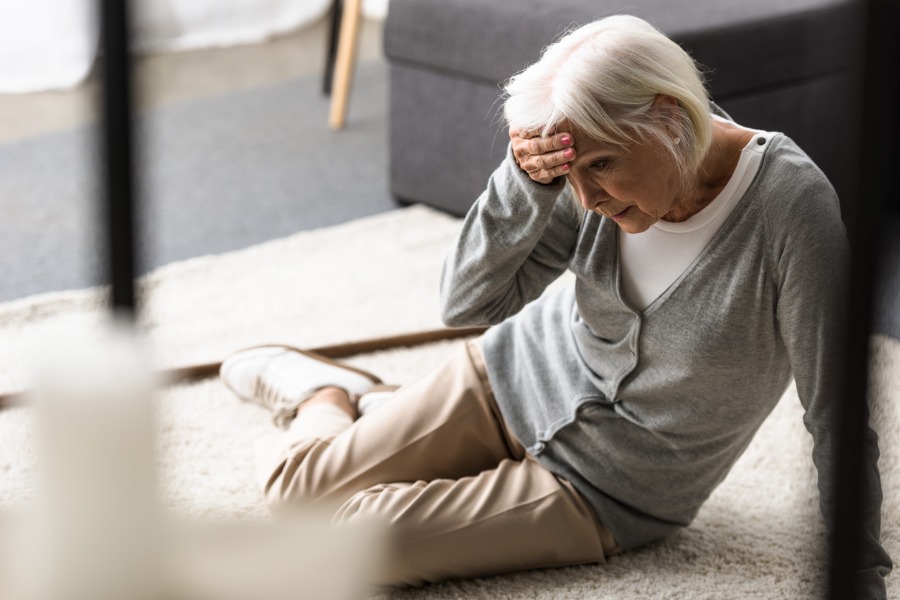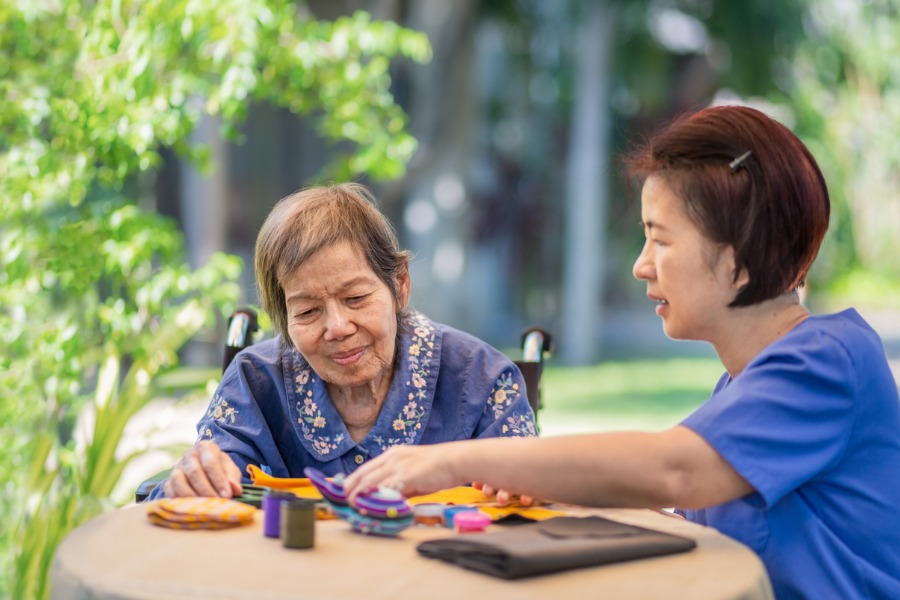
In California, 690,000 seniors are currently projected to have Alzheimer’s disease. By 2025, that number is expected to increase to 840,000. Many Los Angeles area seniors live alone, but continuing to do so safely is complicated after a diagnosis of Alzheimer’s disease.
A diagnosis of Alzheimer’s disease complicates the decision making process regarding whether or not to remain at home alone.
Here are some things to consider.
Risks of Living Alone with Alzheimer’s Disease

A senior with Alzheimer’s in Los Angeles faces many challenges. The challenges result from their limited cognitive abilities and difficulty remembering important details. Activities of daily living and instrumental activities of daily living are often more difficult to manage alone. The level of difficulty increases as they progress through the stages of Alzheimer’s disease.
A senior in Los Angeles with Alzheimer’s disease is at increased risk of:
- Wandering
- Falls
- Leaving the stove on
- Medication mismanagement
- Poor nutrition
- Poor hygiene
- Driving unsafely
- Isolation and loneliness
In the earlier stages of the disease, it’s sometimes possible to minimize risks simply by making changes to the home environment.
For instance, removing tripping hazards like throw rugs or unnecessary furniture decreases the risk of falling.
A senior has an easier time remembering to take medications when a family member or homecare provider offers assistance as they fill their pill box or reminders to take their medications.
Scheduling a ride to church or the community center with a friend or in-home aide helps with isolation and loneliness while eliminating risks that come from driving.
In the mid stages of Alzheimer’s disease, the ability to respond appropriately diminishes. The brain’s ability to recall information and process even simple steps declines too. As declines happen, families often struggle with the idea of keeping their loved ones at home. Many consider assisted living or a memory care facility.
The need for increased care isn’t necessarily an indication that your loved one must move. Having a plan and the right support makes the difference.
Have a Plan
As the family caregiver for a senior with Alzheimer’s, it’s important to understand what you’re facing and to have a plan. Discuss your plan with other family members. Ensure that it includes expectations, the needs of your loved one, and concrete ways in which you can receive the assistance you need. Here are a few things to consider as part of your plan and as the disease progresses.
Consistency in the Daily Routine
Consistency is important to the person with Alzheimer’s disease because this form of dementia causes the brain to process information in a different way. An inconsistent schedule often leads to frustration, uncertainty, and a feeling of a loss of control. To help ensure consistency, schedule certain times of day and days of the week for specific activities like bathing and grooming. Have set meal times with some flexibility. Create a routine that works with your loved one’s sleep and wake schedule. Ensure that everyone who is providing care does their best to stick to the schedule and routine.
Involve Your Loved One in the Care Plan

Especially in the earlier stages of the disease, empower your loved one to remain active in care decisions. Offer options, and respect their choices. Encourage your aging loved one to keep a list of medications and to sit with you while you help them to organize their pillbox. Let them play a part in establishing a schedule or routines. When it’s time to make decisions about their care or hire a home caregiver, ask for their input. Keep the choices simple (ie: option A or option B) when possible to minimize frustrations.
Technology and Alzheimer’s Disease
Technology offers great assistance in managing medications, scheduling appointments, and keeping track of important phone numbers and contact information. Through the use of technology, it’s possible to monitor your loved one’s movement throughout the home and prevent wandering. Certain devices alert you if your loved one leaves the home or forgets to turn off the stove or lock the door. In the mid to later stages of Alzheimer’s, technology can let you know if your loved one gets out of bed or experiences a fall.
In Home Care for Alzheimer’s Disease

Even the most capable Los Angeles family caregivers often need support when caring for a loved one with Alzheimer’s disease. Having a professional to walk this path alongside you ensures that your loved one always has the assistance they need and that you have time for important breaks for recreation, to care for yourself, and to work or spend time with other family members and friends.
A professional caregiver can assist with tasks that may be physically or emotionally difficult for you to complete such as bathing and helping your loved one with transfers or ambulation. They also have specific training in coping with difficult behaviors or emotional responses.
Los Angeles In-home caregivers also assist you by sharing information and tips, providing training and giving you a break at the times when you need it most.
In later stage Alzheimer’s, hiring an in-home caregiver ensures you receive much needed support. Having elder care in place means that there will be someone available to assist your aging loved one anytime of day or night, helping you to feel confident that the senior is receiving the proper support and care and a compassionate response to needs while you rest or spend time away from the home.
Conclusion
It is possible for a senior with Alzheimer’s to safely remain in their Los Angeles home. To reach this goal, familiarize yourself with the risk factors and how they might change as the disease progresses. Surround yourself with a team that can provide assistance, and have a plan. Recognize that it takes a village to safely manage this disease with dignity and compassion.
Salus Homecare of Los Angeles employs Alzheimer’s specialists who are ready to provide your family with the support you need to keep your loved one at home. Whether your needs are resolved with hourly assistance or around the clock support, we’ll create a customized care plan. The plan is easy to amend as needs change. Contact us anytime with questions or to schedule your complimentary in-home assessment. We’re here to help.
There is no ads to display, Please add some

